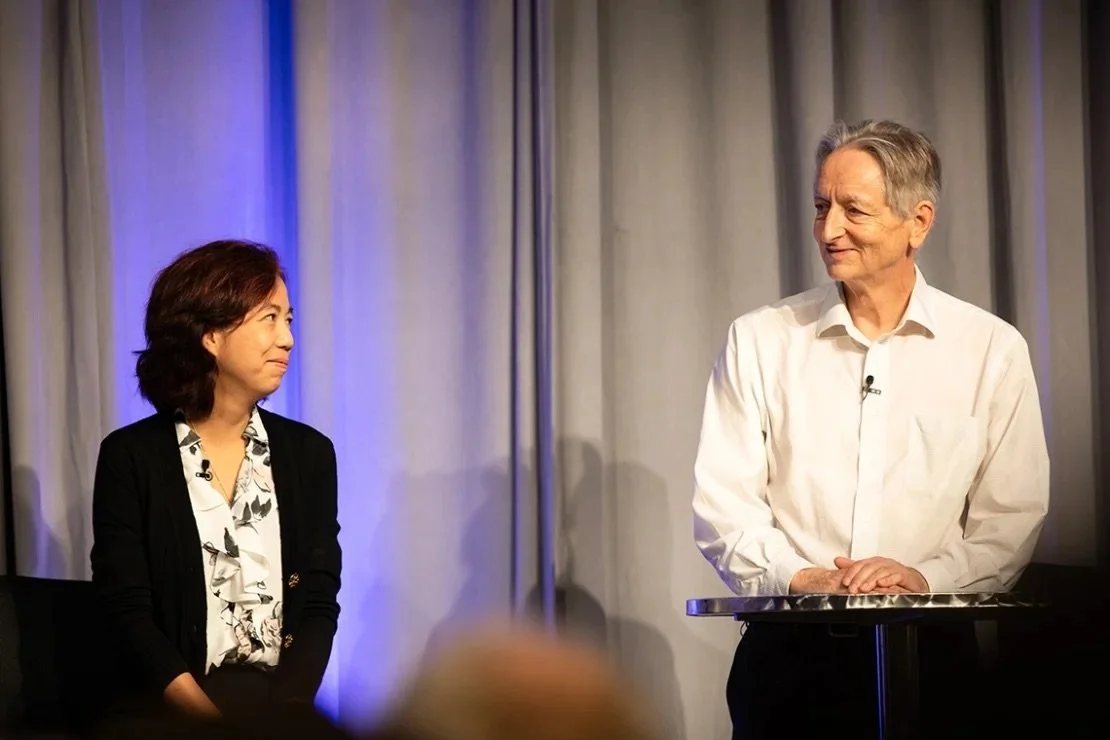CS alumnus Francois Gouelo is CEO of hospitality startup Enso Connect.
Why is COVID-19 more severe in some people? Researchers use genetics, data science to find out
Geoffrey Hinton to give scholarly talk on whether AI will eclipse human intelligence
Geoffrey Hinton will be giving an academic talk on artificial intelligence at Convocation Hall on Oct. 27. (Photo: Polina Teif)
After capturing the world’s attention with his warnings about the existential risks posed by rapid advancements in artificial intelligence, Geoffrey Hinton will be engaging directly with researchers and scholars at a University of Toronto event.
A U of T University Professor Emeritus in the Department of Computer Science who is often referred to as “the godfather of AI,” Hinton will tackle the question “Will digital intelligence replace biological intelligence?” during an academic talk at Convocation Hall on Oct. 27. (Tickets to the in-person event are sold out, but a recording will be shared publicly at a later date).
His lecture will be followed by a Q&A session co-ordinated by Sheila McIlraith, a professor in the Department of Computer Science in the Faculty of Arts & Science who is a Canada CIFAR AI Chair and an associate director at U of T’s Schwartz Reisman Institute for Technology and Society.
The session will give Hinton an opportunity to directly engage with researchers and scholars from across the university regarding the revolutionary technology he helped create.
“AI is re-shaping the way we live, work and interact with each other,” says McIlraith. “Given the current public discourse about AI, it’s particularly important that scholars across disciplines learn from each other and engage in an informed exchange of views regarding the societal implications of this transformative technology.”
U of T provides an ideal forum for such scholarly discourse, she adds, because of U of T’s historical role in the development of AI, the “breadth and depth” of expertise at the university and the city of Toronto’s position as a global hub of AI research and development.
"The conversation around AI is no longer housed in the computer science lab or within the offices of Big Tech. It needs to be multidisciplinary to advance our collective understanding of the opportunities and the potential risks so we can work to avoid the risks while benefiting from all that AI has to offer.”
The Schwartz Reisman Institute for Technology and Society and the department of computer science in the Faculty of Arts & Science are co-hosting Hinton’s talk in collaboration with the Vector Institute for Artificial Intelligence and the Cosmic Future Initiative at the Faculty of Arts & Science.
— Original story by Adina Bresge for U of T News
New book explains how we know climate-change computer models are accurate — and why we should believe them
GPTZero enters the chat: Alum Alex Cui and his breakthrough in AI detection
Humanity is at a ‘turning point’ with AI, Geoffrey Hinton tells CBS News's 60 Minutes
University Professor Geoffrey Hinton speaks with 60 Minutes correspondent Scott Pelley about advanced artificial intelligence. (Image courtesy of 60 Minutes)
Geoffrey Hinton, often dubbed the “godfather of artificial intelligence,” explained the potential benefits — and risks — of the technology he helped bring into existence on CBS News’s 60 Minutes.
A University Professor Emeritus in U of T’s Department of Computer Science, Hinton told correspondent Scott Pelley about his decision earlier this year to sound the alarm about the existential threat posed by the rapid development of large language models such as ChatGPT and Google’s PaLM.
The cognitive psychologist and computer scientist, whose research contributions set the stage for the current acceleration of AI development, says he has no regrets because of the technology’s enormous potential benefits. But he warns that humanity is at a “turning point” in determining AI’s trajectory — and that the decisions we make today could have far-reaching consequences for the future.
“I think my main message is there's enormous uncertainty about what's (going to) happen next,” Hinton told the newsmagazine program. “These things do understand. And because they understand, we need to think hard about what's going to happen next. And we just don't know.”




















